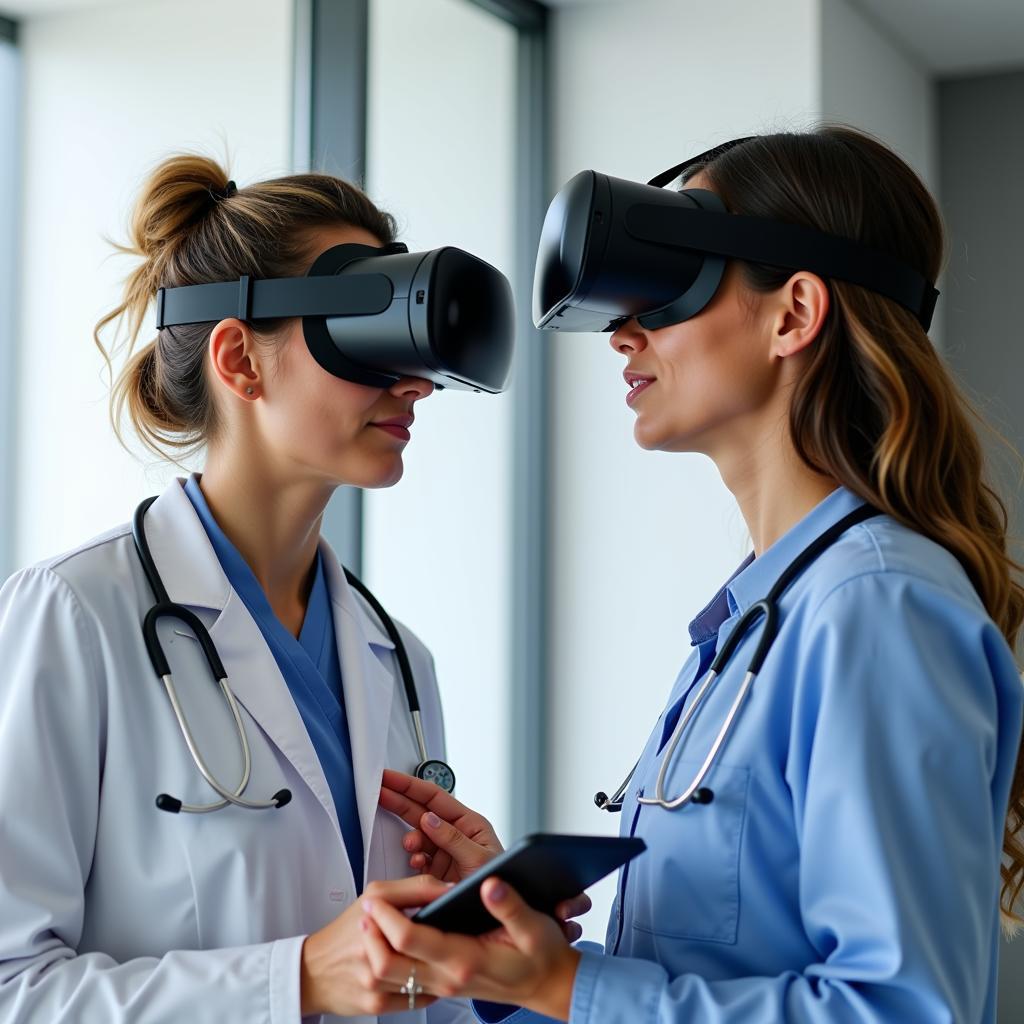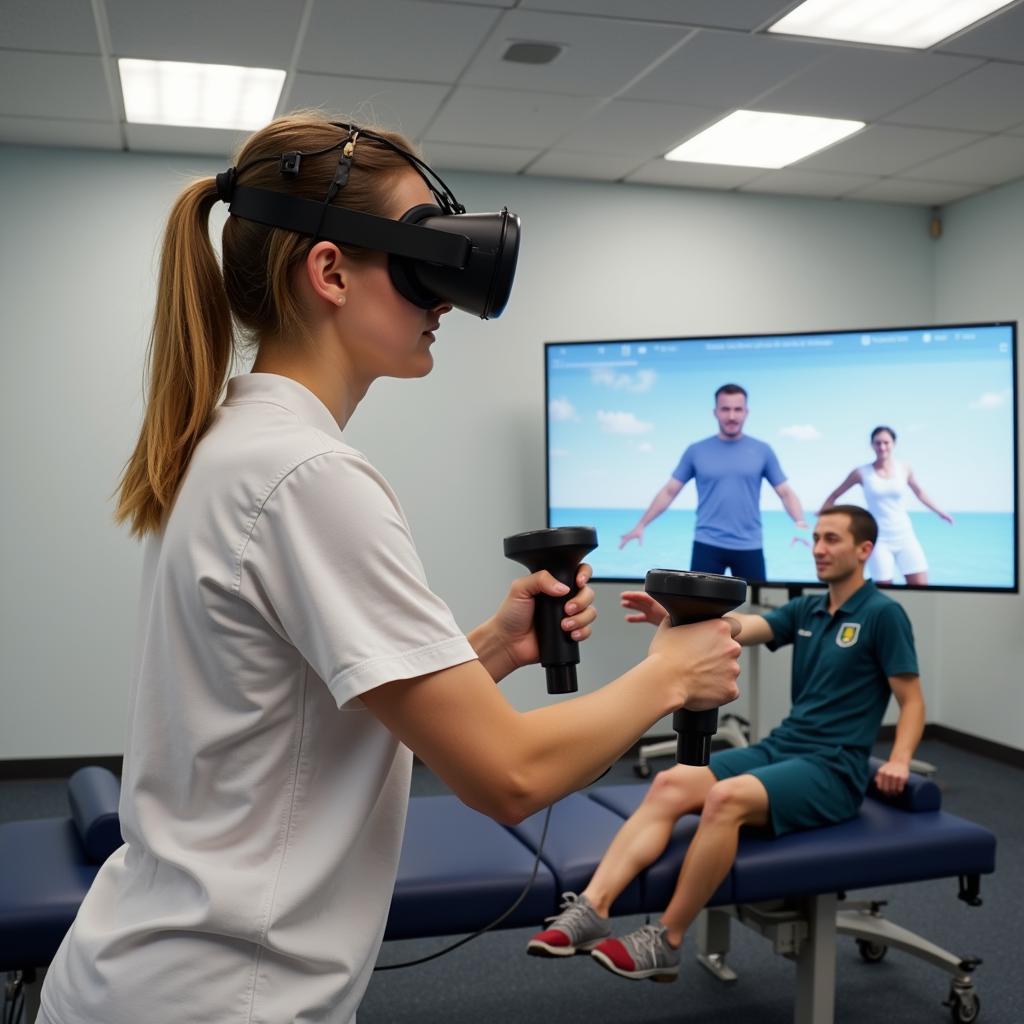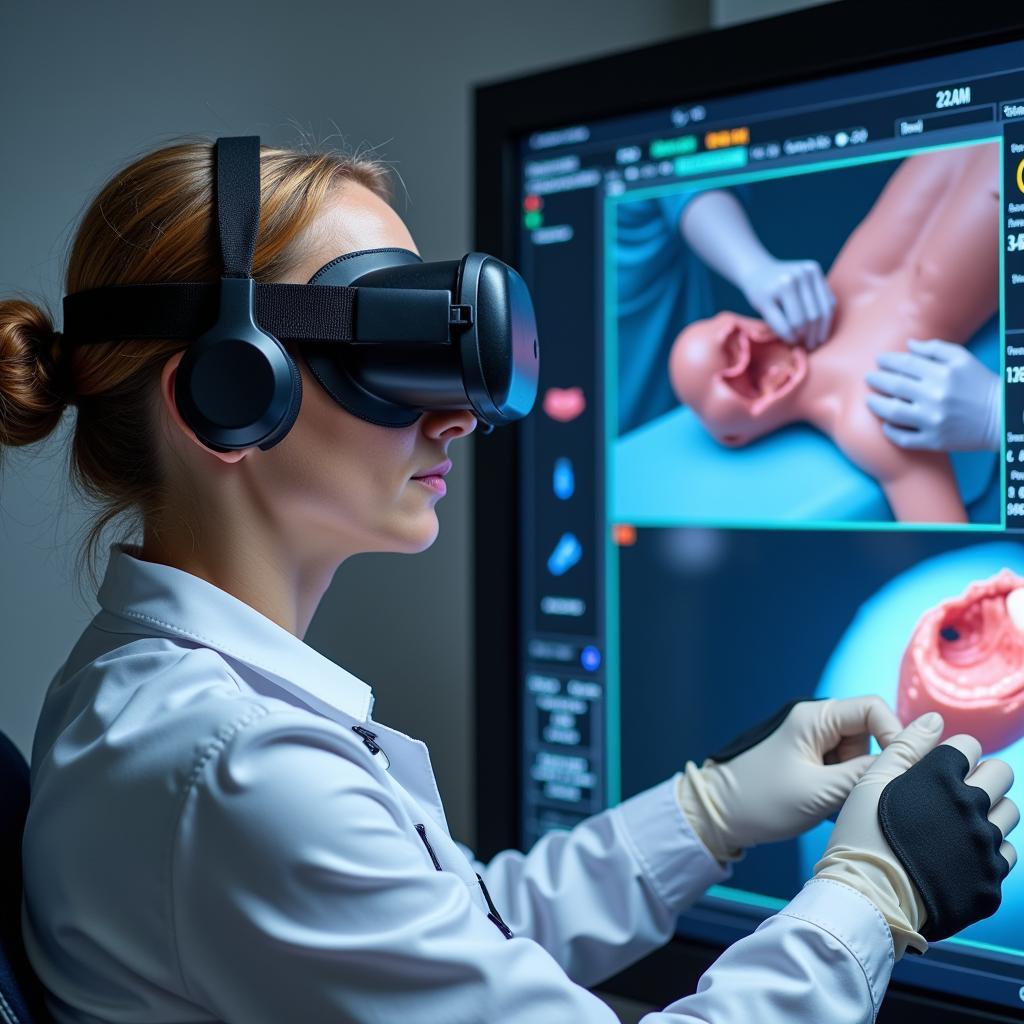Virtual reality (VR) technology is rapidly transforming health care, offering innovative solutions for diagnosis, treatment, and rehabilitation. From pain management to surgical training, VR tools are proving to be valuable assets in improving patient care and advancing medical practices.
Exploring the Applications of VR in Healthcare
VR’s immersive nature creates unique opportunities within healthcare. It allows medical professionals to visualize complex medical data, simulate real-life scenarios for training, and provide patients with engaging and therapeutic experiences. The potential applications of VR in healthcare are vast and continuously expanding.
 Doctor using VR headset with patient for interactive therapy
Doctor using VR headset with patient for interactive therapy
Revolutionizing Surgical Training with VR
Traditional surgical training methods can be expensive and time-consuming. VR offers a cost-effective and efficient alternative. Surgical simulators powered by VR enable surgeons to practice complex procedures in a safe and controlled environment, improving their skills and confidence before operating on real patients. This leads to better patient outcomes and minimizes the risk of complications.
Enhancing Pain Management and Rehabilitation
VR has shown remarkable promise in managing chronic pain and facilitating rehabilitation. By immersing patients in interactive virtual environments, VR can distract them from pain signals and provide engaging exercises that promote faster recovery. This is particularly helpful for patients recovering from strokes, spinal cord injuries, and other debilitating conditions.
 Patient using VR for rehabilitation exercises
Patient using VR for rehabilitation exercises
VR Tools Transforming Healthcare: A Closer Look
A variety of VR tools are currently being used in healthcare, each with unique features and benefits. These tools range from sophisticated surgical simulators to affordable VR headsets for at-home rehabilitation.
VR Surgical Simulators: The Future of Surgical Training
These advanced simulators recreate the operating room environment, allowing surgeons to practice procedures with realistic anatomical models and surgical instruments. The immersive experience enhances their understanding of surgical anatomy and improves their dexterity and precision.
VR Therapy Platforms: Engaging Patients in Recovery
VR therapy platforms offer interactive exercises and games that motivate patients to actively participate in their rehabilitation. These platforms can be customized to address specific needs and track patient progress, providing valuable data for healthcare professionals.
VR Pain Management Systems: A Non-Pharmacological Approach
VR pain management systems use immersive virtual environments to distract patients from pain signals. These systems can be used to manage acute and chronic pain, offering a drug-free alternative to traditional pain medications.
The Impact of VR on Patient Care
The integration of VR in healthcare has a significant impact on patient care. It empowers patients to take an active role in their recovery, leading to improved outcomes and higher patient satisfaction.
“VR is not just a technological advancement; it’s a paradigm shift in how we approach healthcare. It empowers patients and provides clinicians with powerful new tools to improve outcomes,” says Dr. Emily Carter, a leading expert in VR applications in medicine.
Conclusion: The Future of VR in Healthcare is Bright
Virtual reality technology and tools are transforming health care by offering innovative solutions for diagnosis, treatment, and rehabilitation. From improving surgical training to enhancing pain management, VR is poised to play an increasingly important role in the future of medicine.
FAQ
- Is VR safe for all patients?
- How much does VR therapy cost?
- What are the limitations of VR in healthcare?
- What types of conditions can VR treat?
- How can I find a healthcare provider that uses VR?
- What are the ethical considerations of using VR in healthcare?
- What are the latest advancements in VR technology for healthcare?
Common Scenarios and Questions
- Scenario: A patient is recovering from a stroke and has limited mobility.
- Question: How can VR help improve their motor skills and coordination?
- Answer: VR therapy can provide engaging exercises that target specific muscle groups and improve coordination in a safe and controlled virtual environment.
Further Exploration
For more information on specific care tools for rehabilitation, check out our article on care tool for rehab.
“The ability of VR to personalize and gamify rehabilitation makes it a highly effective tool for engaging patients in their recovery journey,” adds Dr. Michael Davis, a renowned physical therapist specializing in VR rehabilitation.
 Doctor training on a VR surgical simulator
Doctor training on a VR surgical simulator
Need more support? Contact us via WhatsApp: +1(641)206-8880, Email: [email protected] or visit us at 910 Cedar Lane, Chicago, IL 60605, USA. We have a 24/7 customer support team.

Leave a Reply